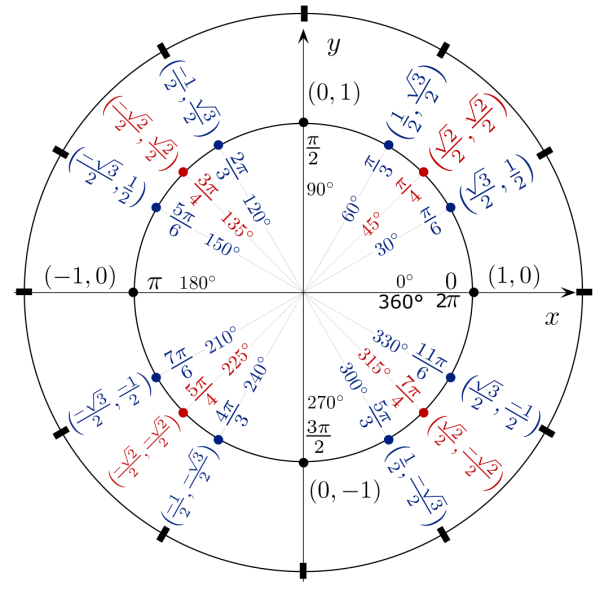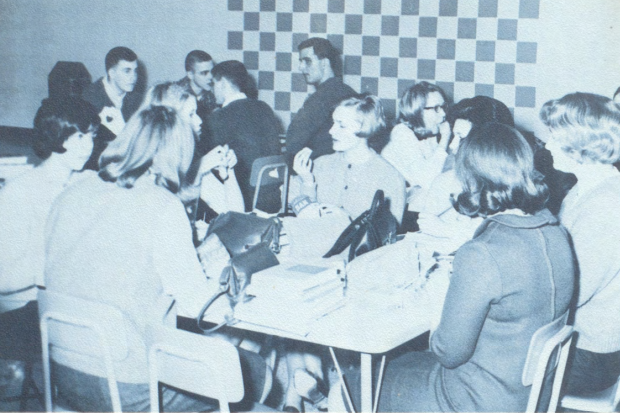Mentor High offers several Advanced Placement (AP) Courses for students to take. Our teachers for these courses always have great advice for how to succeed, and there are other options such as online resources. But what do our student veterans of these courses say? We interviewed MHS veterans of numerous classes and multiple grade levels. Here’s what they told us:
AP Seminar

AP Seminar (AP Sem), taught by Mrs Coleman, is a great first AP course for many students here at MHS. However, since it follows a format different from many other exams, it can be beneficial to hear from our students about how to succeed.
From the students we interviewed, it is generally agreeable that one key component to success in AP Sem is staying on top of your work. Students Tatyana Sowerby, Nick Payne, and Olivia West all gave this as their first piece of advice when asked. Olivia added that procrastination can very much inhibit your success and bring you unnecessary stress.
Further, these three students also explained the importance of coordination when it comes to your group projects. Tatyana and Olivia both explain how working with your group is a fantastic opportunity; helping them with their work as well as falling back upon their advice is key. Nick goes on to explain how when initially giving Mrs Coleman your preferred groupmates, you should keep in mind the type of student each individual is, rather than just picking your friends.
Finally, when it comes to direct AP Exam preparation, Nathan Colagross suggests paying close attention to the rubric, following its keywords, as well as preparing yourself to be able to write under pressure. Olivia builds upon this by stating “Take the practice assignments seriously!” She elaborates, saying that accustoming yourself to the practice writings will induce greater ease when it comes to the actual exam since what is practiced in class is the same as what is expected in the exam.
AP Precalculus

Currently taught by Mr. Skilton, AP Precalculus (AP Precalc) is a one-year-old AP course that many students are still wondering about the keys to success. Here, at MHS, we have several students who performed well in Precalc’s opening year, and here’s what some of them have said:
Our students say that recording detailed information and having good notes is key. Chloe Rhodes tells us that taking detailed and understandable notes is very important, as well as following along with class lessons as closely as possible. To add, Adrian Herbas emphasizes the importance of highlighting key formulas/equations for each concept covered.
Further, student veterans tell us that practicing and revisiting your weak areas is necessary. Student Leah Meckler recommends requesting extra help as needed by consulting Mr. Skilton before and after class, as well as asking questions during “vertical whiteboarding.” Adrian agrees, saying that asking questions in general about your weak areas is important, particularly from assessing your tests/quizzes to see where you fall short.
Ethan Deptowicz tells us about the importance of studying/reviewing, specifically explaining how reviewing Algebra can be very helpful earlier on in the year to keep your foundations of Precalc topics strong. Further, he explains that studying FRQ examples is great both in class and in preparation for the AP test and that holding yourself to understanding trig functions and the unit circle is very important.
AP US History

Mr. St. Hilaire and Mr. Chicone cover AP US History (APUSH) here at MHS and have a large number of students who take the course. APUSH is the first AP course for many students alongside AP Sem. Here’s what our student advice is:
Understanding general concepts and developments within US History is key, more so than specific events and terms. Sydney Fink tells us this, saying that understanding the reasons behind events and their significance must be prioritized above specific terms. Sam Wertenberger answers similarly, telling us to “emphasize the social and cultural effects over knowing the exact events.” Student Casey Gray says something similar, telling students to read the textbook to understand the overarching concepts it displays, whether they believe they need to or not.
Another consistent response from students is to make good use of the digital resources available to them. Student Luca Spataro gives the specific advice of consulting the YouTube channel “Heimler’s History” to refine your understanding of different periods as well as your writing skills. Brian Mignogna tells us that when reviewing, take advantage of digital resources such as exam review quizlets and YouTube videos. Sydney agrees, suggesting Quizlet as well as AP Classroom resources catered towards APUSH.
Finally, it is key to review the FRQs (DBQ, LEQ, SAQ). Casey tells us that when he took the AP exam, he felt underprepared for the writing section compared to the rest of the exam. Sam believes it is key to analyze and understand each FRQ format and rubric, practicing with them consistently throughout the year, especially in amounts of time similar to the time on the AP test. Master how each point is earned, and familiarize yourself with the task verbs (evaluate, to what extent, etc.).
AP Biology
AP Biology (AP Bio) is a very popular AP Science course here at MHS. Taught by Mr. Butler, AP Bio is generally regarded as one of the more difficult APs, so naturally, we need to cover how our student veterans feel.

Mark Pastore, Kaitlyn Morris, and Tatyana Sowerby all told us that one key to AP Bio success is notetaking. Mark explains that having comprehensive notes for each topic is very beneficial, and Kaitlyn and Tatyana both say that taking good, detailed notes and reviewing them later on is important. Further, Ryan Olver found that the use of pictures is a very helpful way to record and understand concepts when notetaking.
When it comes to the studying aspect of AP Bio, memorization is key. Mark explained the importance of memorizing different concepts, and Kaitlyn said that repetition is key: memorize and review. Tatyana says that remembering Mr. Butler’s memory tricks that he provides you with in class can be helpful for tests.
Additionally in test prep, Mark says to make sure to practice FRQ writing. Consistency with writing will hone your skills and earn you more points. Ryan suggests finding connections within your concepts, boosting your understanding and memory related to each topic. Kaitlyn prioritizes looking for keywords, as harping on them above else will ensure a strong understanding of the topic as a whole.
AP English Language

Mrs. Bolles teaches the popular AP English Language (AP Lang). Introducing many new forms of writing and analysis, AP Lang takes many students out of their comfort zone as they adapt to its work. To make this process easier, here’s some advice from successful AP Lang students.
A key to success in AP Lang is, believe it or not, just listening to Mrs. Bolles. Addison Muha expressed how during class lessons, you should pay close attention to and remember what seems important because it almost always will be. Student Vinny Gamiere also says to listen to Mrs Bolles, since she will guide you through the processes of writing very well. Further, Vinny explains that the key to improvement is to take criticism on your essays well, as working in the future to correct them will show genuine growth and improvement.
Our students also stress the importance of practice in AP Lang. Josh Wieland says to take the time to do the AP Classrooms to the best of your ability, as they are worth the practice. He advises not to take the route of looking up each question just to get the assignment done fast. Addison found that for her, doing work outside of class was critical to success. Further, she advises getting extra help or consultation whenever needed, since, as stated previously, Mrs Bolles gives great aid for improvement. Additionally, as mentioned by Josh, taking the practice FRQs seriously is vital, as they accurately reflect the AP exam.
Finally, successful AP Lang students told us about the importance of quality annotating. Vinny explains how taking the time to learn how to make good annotations is beneficial to your reading analysis and writing. Making quality annotations without taking too much time can be what makes or breaks a certain score. Similarly, Tatyana Sowerby says that when reading stimulus material, work to find deeper and exact emotions, as doing so will give you a better understanding of what you are reading and writing about, as well as give you more points in the end.
AP Statistics
Mr. Lohrey teaches MHS’s AP Statistics (AP Stats). AP Stats is a popular AP course, with many students taking the class as their math credit or even in addition to another math course. However, Statistics provides an introduction to forms of mathematics many students have not been exposed to yet. Given this, here’s how past students found success:
One piece of advice our students gave us was to understand concepts rather than formulas alone. Ryan Olver and Sarah Blakemore, for example, both informed us that understanding the meanings and reasonings behind concepts in the class is important, rather than just memorizing formulas and calculator functions. If you understand what you are doing and why, the topics will come easier to you. On a more specific note, student Zahran Shams recommends working hard to fully understand the “normal distribution” and “normal curve” in class, as it will apply to a large portion of the topics in AP Stats and you will have an easier time if you can use it well.

According to students, the notes in AP Stats are of great importance as well. According to Sadie Stovall, it was very beneficial to keep up with taking good detailed notes to refer back to, as well as having everything organized. Being able to find and revisit helpful notes is important to success. Student Ricky Norris agrees, telling us “for sure,” above all else, to make sure you take notes on the subjects being taught.
Finally, class engagement and homework also seem to be big pieces of advice from successful AP Stats students. Sadie holds this advice, explaining how both doing all the homework and staying engaged in the class led her to be successful. She tells us how staying engaged has benefits beyond statistics skills, as many of the conversations you have in class are very interesting in general. To add, Ryan says to stay focused in class, and Sarah advises to always be listening to Mr Lohrey. Similarly to Sadie, Ricky, and Sarah found that it was important to always do the homework, regardless of if they’re being checked for a grade or not. They are there for a reason, they help hone your skills, and they allow you to be more engaged with the class the next day.
AP US Government & Politics
AP US Government & Politics (AP Gov), taught by Mr Couch, is a very popular AP social studies class, generally taken by students in their junior year. With so many students, we found it necessary to include some advice from our student veterans who demonstrated success in the past.
A large piece of advice from our students was to keep up with your assignments. Being a blended course, holding yourself to getting your assignments done can be harder than in other classes. Loren Wandersleben,

Alex Nicoletti, and another student (who has chosen to remain anonymous) all advised to get assignments in on time when asked about how to be successful. Being consistent and honest about assignments in AP Gov will boost both your grade as well as your understanding of concepts.
Another suggestion was related to the in-class portions of AP Gov. Loren tells us to value Mr Couch’s lectures, as they are very applicable to the tests in class. Sarah also advises to listen to Mr. Couch during these times. Class participation is beneficial as well. An anonymous student says not to be afraid to express your opinions in class, as resulting conversations keep you engaged and provide good learning opportunities. Sarah agrees, suggesting class participation as being important as well.
Finally, a balance of commitment and non-over-exhaustion is important. Multiple of our students, such as the anonymous student mentioned previously, suggest not to take things too seriously. Be dedicated to your work, but do not stress yourself out. Further, Loren says not to stress, however, she explains the importance of not zoning out at the same time. When it comes to preparation with the textbook, Alex suggests not obsessing over it too much, but rather holding yourself to understanding its vocab, important court cases, and important documents.
AP Chemistry
Alongside AP Bio, AP Chemistry (AP Chem) is an AP Science course route many students take. Currently taught by Mr Hogan, AP Chem explores chemistry to a deeper level than touched on by our other chemistry courses, here’s what our students had to say about how to handle it all:

Student Casey Gray advised that to be successful, you need to make sure you know common formulas that will come up repeatedly. Once you have those down, you are more greatly able to handle problems/questions. Danny Wardeiner told us that to be successful, you should consistently study the formulas you learn in class. Additionally, Tatyana Sowerby suggests not to get too caught up in the math aspects, and try to understand the concepts alongside the formulas and processes.
Another common piece of advice from our students was related to effectively gathering class information. For example, Danny says to write down any information that may be useful. Having it recorded somewhere for later can help you be successful. Student Kira Florek advised not to be afraid to ask questions about things you need to know more about. Casey agrees, suggesting asking lots of questions as well.
The last big piece of advice from our MHS AP Chem veterans is not to be too overpressured. Tatyana, for example, suggests not being pressured too much when it comes to tests, just doing your best and putting interest into the concepts. Kira explains the importance of being willing to make mistakes. She says that when you make mistakes, you should utilize them as opportunities to learn. Danny says to stay focused, and Casey says to pay attention to lessons. Make a true effort to follow these things, and you should have a non-overpressured time.
That concludes our series of advice for MHS students about how to succeed in your AP classes. We hope you learned something today, and we hope you will be successful in your AP classes. Just remember neither AP scores nor class grades define you as a person, so stay positive no matter what your outcomes are.










